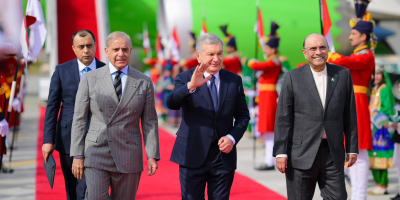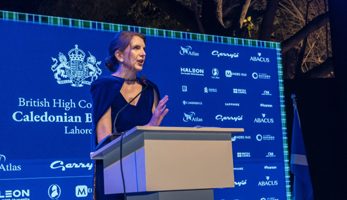Effective virtual diplomacy need of the hour: Analysts

ISLAMABAD, APR 21 (DNA) – The coronavirus pandemic has changed the way diplomacy was conducted and the transformation will see it practiced more and more through virtual meetings in the online world.
The trend, which only looks like escalating in the foreseeable future, is expected to have a significant impact on international relations going forward, and will require capacity building of diplomats and other foreign service officials for enhanced productivity and output.
The views were shared at a webinar titled ‘Emerging Trends in International Relations & Diplomacy and Pakistan’, which was organized by Institute of Policy Studies (IPS), Islamabad as part of its webinar series ‘Covid-19: Global Challenges, National Response’.
The session was addressed by Ambassador (r) Syed Abrar Hussain and Ambassador (r) Tajammul Altaf as main speakers and jointly chaired by former secretary finance and member of IPS National Academic Council Dr Waqar Masood Khan and Executive President IPS Khalid Rahman.
The speakers were unanimous that the coronavirus pandemic has affected the world massively and its impact is already being felt at the local, regional and international levels in multifarious ways. International diplomacy is one area that is at the center of the whole phenomenon, and while it has a huge role in tackling the global pandemic, it may also have its shape, form and practices altered significantly in the post-Covid-19 world.Ambassador Abrar viewed that diplomatic practices will change significantly in the post-pandemic world where online meetings, discussions and deliberations will become a norm.
He pointed out that the European Council was the first major organization that started conducting its meeting online following the global lockdown, after which many international bodies like the UN Security Council, IMF, World Bank and G20 have started holding a lot of their activities online.
He said such developments will demand new, innovative ways to create a diplomatic impact, as well as a bit of capacity building at the practitioners’ end, as previous practices like VVIP reception and hosting of dignitaries will eventually wither away to some extent.Speaking of the impact of the pandemic on international relations, Abrar said the possibilities of a severe recession loom large, which will be made worse by escalating unemployment all over the world. The situation will be a test of abilities of the global leadership and especially for the major powers which will be required to step up and play an international role. The general impression is that China is emerging as a leader in this scenario whereas the US is losing its influence. There however is still a possibility that the Western countries could unite against China. Either way new international alliances could be forged whereas a completely new world order is also a possibility.The speaker said that Pakistan, in the given circumstances, should continue to endorse all global efforts to combat the Covid-19 pandemic, promote collective efforts within the regional forums like OIC and SAARC, practice efficient economic diplomacy, and strengthen its relations with expatriates who generally send remittances to the country in big numbers but presently are in need of help themselves. Similarly, he added, Pakistan should also make all out efforts to internationally highlight the plight of Indian Occupied Kashmir in the current situation and take like-minded countries on board to jointly raise the issue at the global platforms.
Abrar, in the end, also commended the efforts of Pakistan’s Foreign Ministry, stating that they, along with Pakistani embassies, have been working hard to facilitate the countrymen who were stranded in other countries. He exclusively mentioned two officials of the embassy in Beijing who traveled to Wuhan – which was the epicenter of the pandemic, despite the warning of Chinese authorities that they would only be allowed to return when the lockdown and quarantine period ends – only to look after the welfare of Pakistani students and ended up staying there for 76 days. He stressed that such brave and selfless contributions must also be recognized, acknowledged and encouraged at the national level.
Ambassador Altaf too was of the opinion that the global diplomacy, in the near future, will mostly be virtual and will be heavily based, rather dependent, on technology.Speaking of global affairs, he said the world seems to be divided into visible blocs. Though it is still too early to say how things will shape up in terms of international relations and global politics, going by early signs it seems that the US is now backtracking on its earlier standpoint of global primacy and leadership. The process of globalization, which was expanding fast until recently, is also taking a big hit, especially with America trying to retain its allies from the West by upholding nationalism and protectionism while maintaining that first they need to save their own people and economies. Similarly, the Western countries also want to keep a tight control on strategies to run global economies, technologies and manufacturing lines according to their own will.China, on the other hand, Altaf opined, will be trying to create more international space for itself by extending help to the countries in need. Economically poor countries already are not in a position to face the crisis or sustain the aftermaths of the pandemic on their own, and hence there could be a possibility that the power center of the world may be seen shifting from the West to the East.He said that the analysts across the world are almost unanimous over the need of creating an environment where the focus will be on the greater good of the common man, and with Xi Jinping’s initiatives like ‘Silk Health Road’, China is already showing traits of helping other countries in their time of need. It looks like whichever country does better in this race, may end up taking the lead.Expressing his views on the trend of virtual diplomacy, the speaker called it an opportunity for diplomatic institutions as well as professionals to interact with each other in a way that is least cumbersome and most productive, and where the resources being used previously on the other things could now be used for people’s welfare.“The world today is faced with a global challenge and only a global approach can help us come out of this situation. We will need to build our capacity in such a way where we could strengthen our connections and adopt best practices to work together for the greater good of mankind,” Altaf added. The speakers also agreed on the need that concerning institutions like NDMA, Ministry of Health, Ministry of Foreign Affairs and Ministry of Commerce in Pakistan should work in close collaboration, practice effective health diplomacy to identify the places to procure ventilators, nebulizers, PPEs and other required equipment from, and urgently work out the best mechanism to do the procurement as easily and as quickly possible.
Related News

Uzbek President Mirziyoyev in Islamabad for a two-day state visit
Asnar M Bhatti ISLAMABAD, President of the Republic of Uzbekistan Shavkat Mirziyoyev on Thursday arrivedRead More

British High Commission celebrates Scottish-Pakistani ties at ‘Caledonian Ball’ in Lahore
ISLAMABAD, FEB 5 /DNA/: Held at the historic Sir Ganga Ram Residence, Wednesday’s Caledonian BallRead More


Comments are Closed